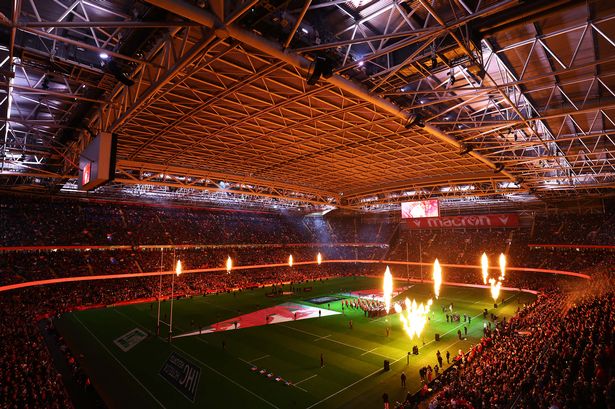The latest headlines from Wales and around the world General view inside the Principality Stadium (Image: Huw Evans Picture Agency)
General view inside the Principality Stadium (Image: Huw Evans Picture Agency)
These are your evening rugby headlines on Sunday, August 17.
Ex-Wales captain lays out blueprint
Former Wales captain Paul Thorburn has re-affirmed his blueprint for the future of Welsh rugby, saying that the number of regions must be cut from four to two with the surviving regions to be wholly owned by the Welsh Rugby Union. The WRU will shortly be entering into a formal consultation process with a number of key stakeholder to decide the optimal structure for the professional game in Wales, with its long-term future set to be decided by the end of October.
Sources within the game say a reduction of professional clubs from four to two is highly likely, while changes to the ownership model will also be considered. Sign up to Inside Welsh rugby on Substack to get exclusive news stories and insight from behind the scenes in Welsh rugby.
And Thorburn, who won 37 caps for Wales and has long been vocal about the need to ‘shake up’ Welsh rugby, believes that a halving of the number of professional sides is the right move, as he proposed the formation of ‘East’ and ‘West’ teams.
“The two surviving regions must be wholly owned by the Welsh Rugby Union,” the 62-year-old told The Rugby Paper. “Where East Wales and West Wales play their home matches is a matter to be discussed.
“It is imperative that we recreate the importance of our club game which used to be the envy of the world. Below that, the community game should not be based on leagues because all that has done is fuel payments to players, money the game can ill afford to lose.
“Do I have any reservations about going down to two regional teams which will cause fury and anger?,” he added. “No, because if they are well run and the pathway to the top works efficiently the whole game will flourish.”
It comes after former Neath full-back Thorburn told BBC Radio Wales that he supported the idea of bringing the regions under the control of the WRU.
“I think the writing has been on the wall for some time that the game is walking a very thin tightrope,” he said earlier this year. “Let’s be fair and honest, Welsh rugby is never going to compete financially with the likes of France, England and Ireland. Never have done, never will do.
“I’ve been an advocate for, I have to say, trying to bring the regions within the control of the Union – albeit I’m not saying the Union is brilliantly administered necessarily.
“But it certainly needs a better structure where we’re all working collaboratively,” he added. “In our history, we’ve had problems with our clubs, then regions, with some going financially in a very difficult position. There’s no consistency, that’s the problem.
“I think we now need to have a better working model, where everyone is working together. I don’t believe that has been the case over the years.”
Wallabies trio forced to fly home
Australia are counting the cost of their remarkable comeback win over South Africa in their Rugby Championship opener, with three players forced to fly home with injury.
Joe Schmidt’s side stunned the Springboks as they came from 22-0 down to claim their first win on South African soil since 2011 in style, knocking Rassie Erasmus’ men off top spot in the global rankings in the process.
Despite falling behind in the opening quarter, the Wallabies rallied to score 38 unanswered points and leave Ellis Park as 38-22 winners, in a result that shocked the rugby world.
However, while Schmidt had plenty to celebrate come the full-time whistle, he has been dealt a new double injury blow with wing Dylan Pietsch and prop James Slipper both ruled out of the second Test in Cape Town on Saturday.
Pietsch suffered a broken jaw in the first half of the clash in Johannesburg, while the experienced Slipper failed a concussion test after the match.
The pair will both now return to Australia in the coming days, joining fly-half Ben Donaldson, who suffered an abductor strain in training ahead of Saturday’s match. There is also concern over the fitness of captain Harry Wilson, who pulled up in discomfort after scoring the second of two tries at Ellis Park.
Wing Filipo Daugunu, prop Rhys van Nek and centre Hamish Stewart have now been called into the squad by Schmidt and will link up with their team-mates this week.
Kay: Crack down on cheating
Former England international Ben Kay has called for a crackdown on cheating in rugby, expressing concerns that an increasing number of players are attempting to sway referees with dramatic reactions to collisions.
The 2003 Rugby World Cup winner’s comments come after much of the British & Irish Lions tour was dominated by debate over an incident involving Wales captain Jac Morgan.
The Ospreys back rower found himself at the heart of controversy after clearing out Wallabies flanker Carlo Tizzano at the breakdown in the dying moments of the match, with Hugo Keenan scoring a dramatic series-winning try later in the same move.
There was anger in the Wallabies camp that Morgan’s clearout was dangerous, but Tizzano soon came under fire himself for what was widely judged to be an overly dramatic reaction to the hit, having theatrically fallen to the ground clutching his head.
Now, Kay has called for action to be taken to avoid such a reaction becoming the norm, warning that rugby’s established reputation as a sport based on fairness and honesty is at stake.
“Sadly, we are seeing more and more diving coming into our sport which, we have always said, sets us apart from the likes of football,” the Leicester Tigers legend told The Rugby Paper.
“We’ve always prided ourselves on rugby being a tough game and we don’t have people trying to cheat a penalty or get a refereeing decision.
“We saw Tizzano rolling out from the ruck against the Lions and holding his head. If hadn’t rolled out clutching his head the way he did it wouldn’t have been looked at. “But this is just part of a wider picture in the modern club and international game.
“It’s something that has crept into rugby a bit, particularly with people worried about player safety and welfare,” he added. “It’s important not to allow it to become the norm because, as we’ve seen in football, it puts those who do it in a poor light, makes rugby look bad and also puts added pressure on officials who have a tough enough job as it is.”
